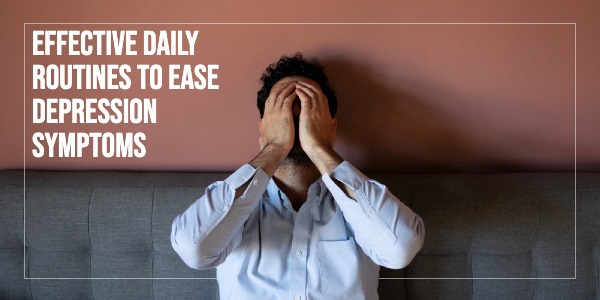10 Daily Habits to Ease Depression And Boost Mental Well-being

Written by
Shebna N. Osanmoh I
Reviewed by
Dr. Ellen A. Machikawa- Daily habits like exercise, sleep, and social connection can ease depression and improve well-being.
- Professional help and support groups are vital for managing symptoms.
- Progress takes time—celebrate small wins and be patient with yourself.

Living with depression can be challenging. However, incorporating positive daily habits into your routine can significantly enhance your well-being and assist in managing symptoms. While these habits cannot replace professional treatment, they can complement therapy and medication, serving as powerful allies in coping with depression.
1. Regular Exercise for Long-Term Benefits
Why It Helps: Exercise spurs endorphin release, nature’s mood enhancer. It can also slash stress and elevate energy.
Advantages:
- Releases endorphins, the body’s natural mood lifters.
- Reduces stress hormones.
- Improves sleep quality.
- Boosts self-esteem and energy levels.
What to Do: Prioritize 30 minutes of activity daily. Even simple endeavors like walking or yoga can be transformative.
Recommendation: Incorporate daily physical activity into your schedule. This doesn’t have to be strenuous – even a short walk, yoga, or stretching can be beneficial. Aim for at least 30 minutes of moderate-intensity exercise on most days.
2. Maintain a Balanced Diet
Why It Helps: A balanced diet fortifies the brain. Ingredients like Omega-3s have mood-boosting properties.
Benefits:
- Provides essential nutrients for brain health.
- Intake of Omega-3 fatty acids and flaxseeds has been linked to mood enhancement.
- Avoiding excessive caffeine and sugar can stabilize mood swings.
What to Do: Ensure a diverse intake of vitamins and minerals. Keep hydrated and moderate caffeine and sugar consumption.
Tip: Stay hydrated. Hydration plays a crucial role in mood regulation and cognitive function.
3. Get Adequate Sleep
Why It Helps: Quality sleep can rejuvenate the mind, potentially alleviating depressive symptoms.
Benefits:
- Improved mood and cognitive function.
- Alleviates some depressive symptoms.
What to Do: Aim for 7-9 hours nightly. Craft a serene sleep environment and minimize pre-bedtime stimulants.
Recommendation: Aim for 7-9 hours of sleep nightly. Establish a bedtime routine, optimize your sleeping environment for comfort, and avoid caffeine or other stimulants before bedtime. If sleep remains elusive, consult a medical professional.
4. Practice Mindfulness and Relaxation Techniques
Why It Helps: Techniques like meditation can combat stress and usher in tranquility, molding a resilient mindset.
Benefits:
- Reduces stress and anxiety levels.
- Improves emotional regulation.
- Counteracts negative thought patterns.
What to Do: Carve out daily moments for deep breathing or meditation, grounding yourself in the present.
Recommendation: Dedicate a few moments daily for meditation or deep breathing exercises. Integrating mindfulness can foster increased focus and reduce the onset of negative thoughts.
5. Maintain Social Connections
Why It Helps: Social interactions can act as buffers against depression’s isolating tendencies, offering validation.
Benefits:
- Counters the tendencies of social withdrawal common in depression.
- Offers emotional validation and a sense of belonging.
What to Do: Maintain regular touchpoints with friends and family. Embrace social ventures that spark joy.
Tip: Regularly connect with loved ones, be it through calls, texts, or face-to-face interactions. Participate in social activities that resonate with you, providing a sense of purpose.
6. Medication and Professional Treatment
Why It Helps: Medications and therapy can address profound biochemical and emotional aspects of depression.
Benefits:
- Regulates brain chemistry.
- Alleviates severe symptoms of depression.
What to Do: Engage with a mental health professional. Follow medication regimens and consider therapies like CBT or IPT.
Note: While daily habits can offer substantial support, they may not suffice for everyone. Consulting a mental health professional is vital. If prescribed, adhere to medications and ensure consistent follow-ups.
Remember, medications might require adjustments, and therapies like CBT or IPT can further assist in addressing the root causes of depression.
7. Seek Support Groups and Counseling
Why It Helps: Sharing within empathetic spaces can usher in catharsis, reducing feelings of solitude.
Benefits:
- Provides a safe space for sharing and validation.
- Connects individuals with similar challenges, reducing feelings of isolation.
What to Do: Discover support groups, be they virtual or physical. Consider one-on-one counseling for tailored insights.
Recommendation: Whether in-person or online, find a support group that meets your needs. Individual counseling can also provide personalized insights and strategies.
8. Understand the Importance of Time and Patience
Why It Helps: Accepting that recovery isn’t linear can cultivate patience, fostering hope during low points.
Benefits:
- Recognizes the nonlinear nature of recovery.
- Promotes self-compassion during setbacks.
What to Do: Celebrate small victories and lean on your support system during challenging phases.
Tip: Remember, there isn’t a one-size-fits-all solution for depression. Combining various strategies and treatments can be more effective in managing symptoms.
9. Engage in Creative Activities for Self-Expression
Why It Helps: Creative activities, be it writing or art, can act as outlets for expression, fostering connection.
Benefits:
- Offers a medium for healthier emotional expression.
- Boosts self-esteem through a sense of accomplishment.
What to Do: Dive into an art project or pen down your thoughts. Amy LingLin asserts that creative outlets can be a lifeline in depression management.
Note: Creative outlets such as painting, writing, or sculpting can be therapeutic. They provide a new perspective, enhance our connections, and diminish tendencies for isolation. Amy LingLin, CEO of Nail Salon NYC, has emphasized the transformative power of creative expression in managing depression.
Conclusion
Incorporating these daily habits can significantly impact your ability to manage depression and other mental health symptoms. Remember, a holistic approach—blending professional treatment, daily habits, and social support—often yields the best results. If you or a loved one is navigating depression, be sure to seek medical guidance.
A fulfilling, healthier, and happier life is attainable with the right combination of strategies. You are not alone on this journey, and numerous resources and professionals are ready to assist you every step of the way.
